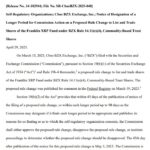The cryptocurrency market saw a relatively stable day on Tuesday, even among lingering concerns about the economic ramifications of the Trump administration’s tariffs. Bitcoin (BTC), a leading cryptocurrency, experienced a slight increase of 1% within the last 24 hours, trading close to $95,400 and nearing the significant milestone of $96,000 for the first time since mid-February. Notably, the CoinDesk 20 index, which tracks the top 20 cryptocurrencies by market capitalization (excluding stablecoins and memecoins), enjoyed a 1.1% gain. Bitcoin Cash (BCH) led the way with an impressive surge of 6.3%.
Meanwhile, stocks related to cryptocurrency had a subdued performance, with Coinbase (COIN) and MicroStrategy (MSTR) rising modestly by 0.9% and 3.3%, respectively. In contrast, Janover (JNVR) stood out by climbing another 16%, benefiting from its strategy of accumulating Solana (SOL). The broader stock market displayed signs of recovery from early April’s turmoil linked to tariff concerns, with both the S&P 500 and Nasdaq gaining 0.55%.
“Hard to fathom how blind the market really is,” remarked Jeff Park, head of Alpha Strategies at Bitwise, highlighting the complexities of the economic landscape. He emphasized that, while speculation grows about potential interest rate cuts by the U.S. Federal Reserve, the broader implications of the tariffs may overshadow such moves.
Economic data on consumer confidence has painted a sobering picture, registering its lowest levels since May 2020, as revealed by a recent survey from the Conference Board. Additionally, the Job Openings and Labor Turnover Survey (JOLTS) indicated a decrease in job openings to 7.19 million in March, slightly below expectations of 7.5 million.
Amid this turbulent backdrop, new developments regarding tariffs surfaced, as Commerce Secretary Howard Lutnick announced a trade deal with an unspecified country, although the details remain pending ratification from that nation’s leadership. Observers note that the resilience of the crypto market amidst these dark clouds reflects a disconnect from current economic realities, leading to varying interpretations of the overall market sentiment.

The Impact of Trump Administration’s Tariffs on the Crypto Market
The crypto market’s recent performance reflects a complex interplay between economic data and investor sentiment. Here are the key points:
- Bitcoin Performance:
- Bitcoin (BTC) has increased by 1%, approaching $96,000, signaling potential bullish sentiment.
- Such momentum can impact investors’ confidence and market trends in cryptocurrencies.
- CoinDesk 20 Index Movement:
- The CoinDesk 20 index rose by 1.1%, with Bitcoin Cash (BCH) leading the charge with a surge of 6.3%.
- This may encourage diversification in cryptocurrency investments among readers.
- Stock Market Response:
- Stocks like Coinbase (COIN) and MicroStrategy (MSTR) experienced mild gains, indicating a cautious market mood.
- Investors may draw parallels between the crypto market and broader stock trends.
- Economic Indicators:
- U.S. consumer confidence is at its lowest since May 2020, reflecting growing economic uncertainty.
- This creates potential risks for individuals tied to consumer spending and investment strategies.
- Job Market Insights:
- The JOLTS survey shows job openings fell to 7.19 million, lower than expected, indicating a slowdown.
- This might influence readers’ job security and financial decisions moving forward.
- Tariff Developments:
- A trade deal has been mentioned, but details are pending ratification, adding to market uncertainty.
- This may affect international business and investment sentiments for readers involved in global markets.
- Market Sentiment Critique:
- Market analysts express concerns about the disconnect between stock performances and economic downturn signals.
- Such insights could guide readers’ investment strategies and risk assessments amid economic uncertainties.
Calm Waters Amidst Economic Turmoil: A Look at Crypto Market Resilience
The crypto market showcased a surprising level of resilience on Tuesday, with Bitcoin inching closer to $96,000, reflecting a potential bullish sentiment amid pervasive uncertainty surrounding the Trump administration’s tariff impacts on the broader economy. This trend diverges sharply from the stark concerns echoed in traditional markets, which have experienced a downward shift in consumer confidence and job openings, indicating an economy that is possibly slowing down.
In terms of competitive advantages, the crypto market appears to be carving out a unique space where it can thrive, even while traditional stocks like Coinbase and MicroStrategy posted modest gains. The 1% increase in Bitcoin and notable 6.3% surge in Bitcoin Cash underscore a strong potential for growth within cryptocurrency assets that may not be as susceptible to immediate economic fluctuations. This resilience could be particularly beneficial for investors looking for alternative assets during times of economic uncertainty.
However, the situation isn’t without its drawbacks. Critics like Jeff Park highlight a “myopic” focus on short-term Fed rate cuts, suggesting that the market may be overlooking deeper systemic risks, such as potentially diminished U.S. creditworthiness due to the global repercussions of tariffs. For cautious investors, this presents a dilemma: while cryptocurrencies may offer high returns, the underlying economic instability could pose significant risks as well.
This mixed sentiment creates an intriguing landscape for various players. Savvy investors who can navigate this complexity are likely to find opportunities in the burgeoning altcoins and emerging cryptocurrencies. Conversely, individuals or institutions heavily invested in traditional markets, particularly those tied closely to consumer confidence, might face challenges as they grapple with potential economic downturns influenced by tariff policies. As the market continues to evolve, it will be fascinating to see how these dynamics play out and which sectors can effectively harness the existing volatility for their advantage.

















